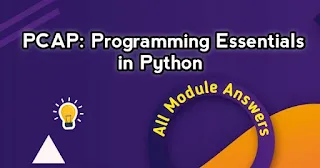Python Essentials 1:
Python Essentials 2:
Python Essentials - Final Test:
Warning!
For searching questions, CTRL+F .if you want correct answer.. type manually.Don't Copy & paste questions in search space.
If you copy paste questions in search options means.. you can't find answer
Which of the following lines properly starts a function using two parameters, both with zeroed default values?
def fun (a=b=0) :def fun (a=0, b=0) :fun fun (a=0, b) :fun fun (a, b=0) :
What is the output of the following snippet?
def fun(x): if x % 2 == 0: return 1 else: return print(fun(fun(2)) + 1)1None- the code will cause a runtime error
2
Which of the following statement are true? (Select two answers)
- The
Nonevalue can be assigned to variables - The
Nonevalue cannot be used outside functions - The
Nonevalue can be used as an argument of arithmetic operators - The
Nonevalue can be compared with variables
- The
The following snippet:
def func_1(a): return a ** a def func_2(a): return func_1(a) * func_1(a) print(func_2(2))- will output
2 - will output
16 - will output
4 - is erroneous
- will output
What code would you insert instead of the comment to obtain the expected output?
Expected output:
a b c
Code:
dictionary = {} my_list = ['a', 'b', 'c', 'd'] for i in range(len(my_list) - 1): dictionary[my_list[i]] = (my_list[i], ) for i in sorted(dictionary.key()): k = dictionary[i] # Insert your code here.print(k["0"])print(k['0'])print(k)print(k[0])
The following snippet:
def func(a, b): return a ** a print(func(2))- is erroneous
- will output
2 - will output
4 - will return
None
What is the output of thee following snippet?
def fun(inp=2, out=3): return inp * out print(fn(out =2))264- the snippet is erroneous
Assuming that
my_tupleis a correctly created tuple, the fact that tuples are immutable means that the following instruction:my_tuple[1] = my_tuple[1] + my_tuple[0]
- can be executed if and only if the tuple contains at least two elements
- is illegal
- may be illegal if the tuple contains string
- is fully correct
A function defined in the following way: (Select two answers)
def function(x=0): return x- may be invoked with exactly one argument
- must be invoked with exactly one argument
- must be invoked without any argument
- may be invoked without any argument
What is the output o the following snippet?
def fun(x): x += 1 return x x = 2 x = fun(x + 1) print(x)- 3
- 5
- the code erroneous
4
What is the output of the following snippet?
my_list = ['Mary', 'had', 'a', 'little', 'lamb'] def my_list(my_list): del my_list[3] my_list[3] = 'ram' print(my_list(my_list))- [‘Mary’, ‘had’, ‘a’ ,’lamb’]
- [‘Mary’, ‘had’, ‘a’ ,’ram’]
- [‘Mary’, ‘had’, ‘a’ ,’little’, ‘lamb’]
- no output, the snippet is erroneous
What is the output of the following snippet?
def f(x): if x == 0: return 0 return x + f(x - 1) print(f(3))6- the code is erroneous
13
What is the output of the following snippet?
tup = (1, 2, 4, 8) tup = tup[1:-1] tup = tup[0] print(tup)
- the snippet is erroneous
(12)(2, )2
What is the output of the following snippet?
def fun(x): global y y = x * x return y fun(2) print(y)- the code will cause a runtime error
4- None
2
What is the output of the following snippet?
dictionary = {'one': 'two', 'three': 'one', 'two': 'three'} v = dictionary['one'] for k in range(len(dictionary)): v = dictionary[v] print(v)- three
- one
- (‘one’, ‘two’, ‘three’)
two
Select the true statements about the try-exception block in relation to the following example. (Select two answers.)
try: # Some code is here... except: # some code is here...
- if you suspect that a snippet may raise an exception, you should place it in the
tryblock - The code that follows the
trystatement will be executed if the code in theexceptclause runs into an error. - The code that follows the
exceptstatement will be executed if the code in thetryclause runs into an error. - If there is a syntax error in code located in the
tryblock, theexceptbranch will not handle it, and a SyntaxError exception will be raised instead.
- if you suspect that a snippet may raise an exception, you should place it in the
Which one if the following lines properly starts a parameterless function definition?
def fun:def fun():function fun():fun function():
What is the output of the following snippet?
def fun(x, y, x): return x + 2 * y + 3 * z print(fun(0, z=1, y=3))9- 0
- 3
- the snippet is erroneous
What is the output of the following code?
try: value = input("Enter a value: ") print(value/value) except: print("Bad input...") except ZeroDivisionError: print("Very bad input...") except TypeError: print("Very very bad input...") except: print("Booo!")Booo!Bad input...Very very bad input...Very bad input...
What is the output of the following snippet?
def ant(): print(var + 1, end ='') var = 1 any() print(var)
12221121
The fact that tuples belong to sequence types means that:
- they can be indexed and sliced like lists
- they can be extended using the
.append()method - they can be modified using the
delinstruction - they are actually lists
A built-in function is a function which:
- is hidden from programmers
- has been placed within your code by another programmer
- has to be imported before use
- comes with Python, ans is an integer part of Python
Python Essentials 1:
Python Essentials 2:
Python Essentials - Final Test:

